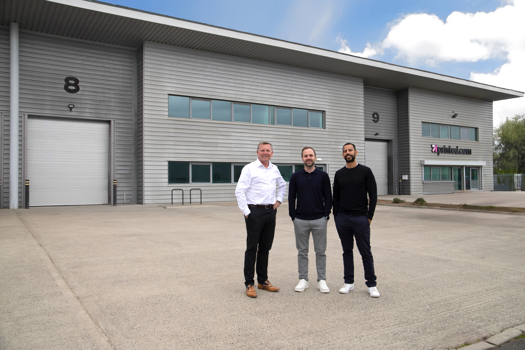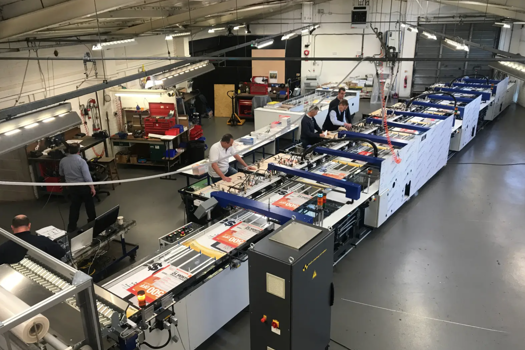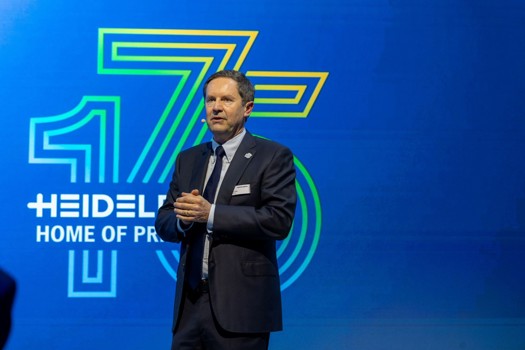The company Tangent is a print and marketing group comprised of a number of firms, including the Ravensworth digital print facility, the online digital print shop the Digital Print Partnership and the digital communications agency Tangent One.
The aim In March last year, group procurement manager Bernard O’Connor was looking at his waste costs and what he saw came as a bit of a shock. "I was looking at the cost of skips and how much waste we were generating as a company," explains O’Connell. "When I totted up the figure, I nearly fell off my chair."
The company was shifting around 30 tonnes of waste per month out of its Ravensworth production base, situated north of Newcastle, of which only 60% was being recycled through paper recycling – the rest disappeared into a skip. It was a costly waste output in both financial and environmental terms and O’Connor decided there had to be a better way of approaching it. However, he says there is a frustrating lack of guidance when it comes to recycling.
"Having done the FSC and ISO 14001, it was natural to try and look at our waste streams," he explains. "However, recycling is quite a grey area. How far you delve into it is really down to the individual, there are no accreditation or standards to meet or adhere to, so there is a lack of guidance. This can be problematic as it is a really complex issue, especially the deeper you delve into it."
Nevertheless, O’Connor was determined to reduce waste and divert more of the company’s by products away from the landfill and so he set about doing things on his own.
The method O’Connor’s first move was to go to the waste plant where the skips of waste from Tangent were sorted.
"The reason I went was so I could see for myself what happened to our waste," he reveals. "It was a real surprise as they were recycling everything and anything you could imagine – and there were financial gains attached, payment for recycling plastics and paper, of which we were previously unaware."
The latter point was an important one; Tangent’s previous waste supplier was taking away the company’s paper and other waste and Tangent had no involvement in what happened next and was seeing none of the revenue generated from that – a tonne of paper, for example, can fetch £35. O’Connor’s focus quickly shifted to putting Tangent into a position where it was in charge of its own waste streams and getting the waste to pay for its own removal – a self-financing waste stream.
With this in mind, O’Connor began his search for a waste management provider that he could trust to recycle everything it said it would and that could cope with the scale of the group’s output. After a selection process he settled on Veolia.
But the real changes had to occur internally. Veolia would take the waste away, but the waste had to be sorted and bailed first. This required staff participation and some well thought-out internal procedures.
Fundamental to this was making the recycling process as easy as possible. This meant, says O’Connor, the right bin in the right place.
"Ravensworth is a vast site, it is very busy. Having as many bins as possible that were industrial in size was crucial. The bins needed to be to hand for the staff so it didn’t take any extra time to sort the waste and they needed to be big enough to store the vast amounts we deal with," he explains.
Two warehouse managers were employed to oversee proceedings, ensuring the right bins were in the right places and that everything was collected and bailed properly. They were also on hand to check the right materials were being put in the right bins by staff.
In addition, O’Connor visits the site every month to "poke around the skips" to check that everything is in order. He then writes a report on how things are going which he distributes throughout the company. It’s crucial, he says, to keep everyone in the loop.
If problems are identified, then the appropriate operations manager will be asked to "remind staff of their responsibilities".
The result O’Connor says that the whole group has got behind the scheme and that the results have been incredible considering the short time the initiative has been running. At its peak in March this year, O’Connor reports that Tangent managed to recycle 98.1% of its waste. The lowest point it has been in the year since the new waste management scheme came in was 97.2%.
"The amount of time and resource you have to commit to manage all the waste streams is substantial so we have been really pleased to have got so far in a relatively short space of time," he says.
The benefits for the environment are obviously significant, but O’Connor says there has also been a real financial reward from the move. The paper and plastic recycled generates good cash returns, so much so that there is enough cash to pay for Veolia’s services with a little bit extra on top, although this extra is not heading into the company’s pockets.
"Any extra return we make goes into a pot for the staff, paying for things like the staff Christmas party," reports O’Connor. "This is crucial, as we need to reward the staff for their recycling efforts and co-operation. It’s a big thank you, basically, for making it such a success."
The 2% not currently being recycled is mainly general food waste and the occasional print production item for which it is more difficult to find a recycling solution. O’Connor has his eyes set firmly on the latter in the coming weeks to drive recycling levels even higher, he says its just about finding the right solution and the right people to make it work.
The verdict For Tangent, taking a closer look at their waste streams and putting recycling initiatives in place has had a substantial effect both environmentally and financially. It’s an area that is often overlooked by printers, says O’Connor.
"Some people only see recycling in terms of using recycled paper and think that is enough. However, you can’t ignore what comes out of the production process and we felt we had a duty to look at that as well," he says.
In terms of mimicking the Tangent scheme, O’Connor does warn that the financial incentives do come mainly from the scale of the Tangent output, so smaller operations may not see the scale of return on the money side of things to go with the green benefits. However, he explains that knock-on financial benefits can be garnered from using the closer waste management in the sales pitch to consumers to stress that as a company you have gone beyond ISO 14001 and FSC.
All round then, it goes to show that you should not be wasteful with your waste – taking a look in the skip can pay dividends in more ways than just a greener planet.
COMMENT
The benefits of dumpster diving
I learned the value of dumpster diving when managing a plastic moulding company. First thing every morning I would look in the waste skips; it was months before my production managers found out how I knew so much about quality and other problems before they did. There is no substitute for managers seeing for themselves the amount and composition of the waste generated by the business.
Tangent’s story has some other lessons. Few companies know what their gross material yield is (despite many having ISO 1400) and yet it is easy to see the tonnage removed by waste contractors from their invoices which can then be compared with the tonnage of material bought – it is usually a shockingly high ratio.
By encouraging staff to segregate waste with some clearly identified bins (and managers frequently looking in them to check), Tangent was rewarded with improved recycling costs. Identifying and measuring different types of waste should prompt questions about how the waste is created in the first place.
Significant savings
As the saying goes, prevention is better than cure. Not all waste can be avoided, of course, but Vision in Print programmes frequently find significant savings. A recent five-day programme at an £8m-turnover printer found savings of over £130,000 a year. Waste reduction programmes have other merits because waste is caused in every area, starting with sales and administrative problems, so it is an opportunity for managers from across the whole company to work together. No job is threatened by saving waste and everyone feels good about doing something for the environment, more over, any saving goes straight onto the bottom line and boosts profit. Vision in Print will be giving lots of advice and tips about how to reduce waste at the Kodak Better Margins seminars being held next month.
Matthew Peacock, managing engineer, Vision in Print
Business Inspection: How to make your waste pay

A large operation can produce a considerable amount of waste at considerable cost. Tangent has discovered how to turn this cost into cash









